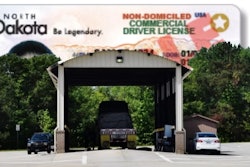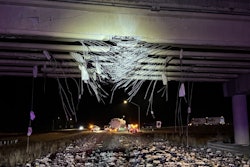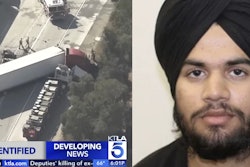An "emergency motion" demanding the U.S. Court of Appeals for the D.C. Circuit immediately halt the Department of Transportation's new rule banning nearly 200,000 non-citizens from holding CDLs says the Federal Motor Carrier Safety Administration showed “no evidence” that immigration impacts safety in trucking, and that the rule is “threatening the livelihoods of more than 200,000 working people and their families.”
On Monday, the court gave DOT until Friday, October 31, to respond to the petition, and the petitioners will then have to respond by the following Monday. Within a few weeks, the court may have ruled on DOT and FMCSA's most forceful regulatory action in years.
DOT's new rule, which came down under emergency circumstances, explicitly bars all temporary non-citizen residents of the U.S., excepting a few specific visa holders, from obtaining CDLs under strict new criteria.
The petition to block the rule makes the case of Jorge Rivera Lujan, an owner-operator who came to the U.S. at two years old, and whose non-domiciled CDL is set to expire next month. The petition lays out a detailed critique of the logic behind, and implementation of, DOT's new rule.
Readers can download the full text of the petition via this link.

FMCSA lacks data but has plenty urgency
The FMCSA, in issuing the rule, cited five horrific crashes involving drivers who it said were in the country illegally. Those five crashes, it said, necessitated a complete shutdown of licensing for non-domiciled drivers and about 194,000 drivers ultimately losing their CDLs.
The crashes, according to the text of FMCSA's rulemaking, “demonstrate that the existing non-domiciliary credentialing framework is dangerously permissive, creating an untenable risk to the public even when the CDLs were properly issued under the existing standards.”
The new legal filing in the case accuses DOT of rushing a rule on the “slimmest of factual bases,” and argues it has a strong case for stopping it promptly to limit the "harmful impacts on the states, localities, school systems, businesses, and communities that rely" on the non-domiciled drivers' "essential work."
The FMCSA cited a “two-front crisis that constitutes an imminent hazard to public safety and a direct threat to national security” because of the five recent, fatal crashes and problems exposed by a DOT audit of CDL licensing programs in six states.
[Related: Six states issuing CDLs 'not consistent with federal regulations': What's going on]
The lawsuit disputes both claims.
"To begin with, FMCSA cited no evidence of a link between immigration status and a driver’s ability to safely operate a commercial motor vehicle," the legal filing says. "And FMCSA cited no evidence showing that asylum seekers, refugees, [Deferred Action for Childhood Arrivals, or DACA] recipients, or others made ineligible by the Rule cannot and do not safely operate commercial motor vehicles."
The lawsuit cites FMCSA's own admission of not having much evidence tying immigration to truck crashes. "There is not sufficient evidence, derived from well-designed, rigorous, quantitative analyses, to reliably demonstrate a measurable empirical relationship between the nation of domicile for a CDL driver and safety outcomes in the United States such as changes in frequency and/or severity of crashes or changes in frequency of violations," FMCSA's IFR states.
With FMCSA data showing there were more than 6,000 large trucks and buses involved in fatal crashes in 2022, the lawsuit argues "FMCSA is disqualifying nearly 200,000 freight drivers and thousands of bus and other CDL drivers, based on data showing that they are involved in fewer than one-tenth of one percent of crashes." The small percentage "does not justify emergency action." The petition to stay the rule argues FMCSA didn't need to implement the rule yet.
"By FMCSA’s logic," the lawsuit argues, U.S. citizens "should be barred from holding CDLs, because they are involved in the overwhelming majority of crashes involving commercial motor vehicles."
[Related: Did DOT Secretary Duffy just kill trucking's 'driver shortage' narrative once and for all?]
Do state CDL credentialing errors justify a total ban?
As far as FMCSA's concern over widespread licensing errors in states, such as "illegal alien" Harjinder Singh getting a full-term CDL in Washington or California licensing drivers long past their length of legal stay in the country, the lawsuit didn't see a safety problem.
"FMCSA fails to connect those administrative issues to safety concerns tied to non-domiciled CDLs," the lawsuit argues. One example of CDL issuance wrongdoing highlighted by the DOT and FMCSA that accompanied the agencies' announcement of the rule changes was that of California issuing non-domiciled CDLs to Mexican nationals. Since Mexican citizens can get CDLs in Mexico that allow them to drive in the U.S., there's no safety issue at stake, the lawsuit argues.
Other "administrative lapses," like issuing CDLs to people with terms that extend long past their legally allowed stay in the country, "likewise do not suggest a safety concern," according to the lawsuit.
FMCSA, for example, stated California had made mistakes on an estimated 15,000 of 60,000 non-domiciled CDLs. The lawsuit argues that "nowhere in either the Rule or those preliminary findings does FMCSA connect the administrative issues it identified -- for example, CDL expiration dates exceeding work-authorization expiration dates -- to public safety, let alone explain why there is any imminent threat."
Further, Lujan and petitioners cite the work authorization documents issued by the federal government itself as stating that non-domiciled CDL holders do have a legal right to work in the U.S.
And since the visa holders allowed to hold non-domiciled CDLs under DOT's new rule "are seasonal workers not permitted to remain and work in the United States year round," petitioners argue, they might actually be less-safe drivers than "asylees, refugees, [childhood arrivals to the U.S.], and people with temporary protected status, who are lawfully present and authorized to work in the United States all year."
The petition to stay the rule also noted something Overdrive previously reported: That while DOT said six states had made significant non-domiciled CDL issuance errors, it had not yet communicated what was going wrong in all of those states.
The petition also addresses criticism that non-domiciled CDL applicants often aren't subject to the level of driving-record scrutiny domiciled applicants are as part of the issuance process. While asylum seekers or refugees from foreign countries might not have driving records to be examined, operators like Lujan, the owner-operator plaintiff named in the case, have been in the country for decades. Lujan's history driving offers plenty to examine, petitioners note.
[Related: Homeland Security explains how 'illegal aliens' get CDLs in the U.S.]
Petioners believe they will succeed on the merits
This latest petition to stay the DOT non-domiciled rule changes concludes by assessing that Lujan and the petitioners have an "extremely" high likelihood of succeeding on the merits of its broader case, and thus that the court should stay the rule immediately.
The suit cites municipalities and schools facing a "a severe shortage of school bus drivers" as well as the harms done to Lujan, other owner-operators, and commenters among non-domiciled CDL holders on the DOT's rule who feared losing their driving work.
[Related: Non-domiciled CDL drivers say DOT’s new rule violates their civil rights]
The U.S. Court of Appeals for the D.C. Circuit is among the highest courts in the country, one step below the Supreme Court, often considering matters of constitutionality where branches of government overlap.
The petitions follow a full-court press from President Donald Trump’s administration to crack down on immigration in trucking, citing "commonsense" and safety.
As previously reported, when Overdrive asked DOT for comment on civil rights concerns raised by non-domiciled CDL drivers, a spokesperson responded with a focus on safety: “The rule on non-domiciled CDLs is about safety and the integrity of the CDL issuing process. It’s really that simple. The rule ensures that anyone operating a commercial motor vehicle is properly identified, vetted, and licensed under U.S. law to protect the safety of everyone traveling on American roads.”











